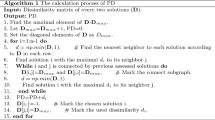Abstract
Recent progress in the development of Evolutionary Algorithms made them one of the most powerful and flexible optimization tools for dealing with Multi-Objective Optimization problems. Nowadays one challenge in applying MOEAs to real-world applications is that they usually need a large number of fitness evaluations before a satisfying result can be obtained. Several methods have been presented to tackle this problem and among these the use of approximate models within MOEA-based optimization methods proved to be beneficial whenever dealing with problems that need computationally expensive objective evaluations. In this paper we present a study on a general approach based on an inexpensive fuzzy function approximation strategy, that uses data collected during the evolution to build and refine an approximate model. When the model becomes reliable it is used to select only promising candidate solutions for real evaluation. Our approach is integrated with popular MOEAs and their performance are assessed by means of benchmark test problems. Numerical experiments, with a low budget of fitness evaluations, show improvement in efficiency while maintaining a good quality of solutions.
Access this chapter
Tax calculation will be finalised at checkout
Purchases are for personal use only
Preview
Unable to display preview. Download preview PDF.
Similar content being viewed by others
References
Ascia, G., Catania, V., Di Nuovo, A., Palesi, M., Patti, D.: Performance evaluation of efficient multi-objective evolutionary algorithms for design space exploration of embedded computer systems. Applied Soft Computing 11(1), 382–398 (2011)
Bleuler, S., Laumanns, M., Thiele, L., Zitzler, E.: PISA – A Platform and Programming Language Independent Interface for Search Algorithms. In: Fonseca, C.M., Fleming, P.J., Zitzler, E., Deb, K., Thiele, L. (eds.) EMO 2003. LNCS, vol. 2632, pp. 494–508. Springer, Heidelberg (2003)
Deb, K., Agrawal, S., Pratap, A., Meyarivan, T.: A Fast Elitist Non-Dominated Sorting Genetic Algorithm for Multi-objective Optimization: NSGA-II. In: Deb, K., Rudolph, G., Lutton, E., Merelo, J.J., Schoenauer, M., Schwefel, H.-P., Yao, X. (eds.) PPSN VI. LNCS, vol. 1917, pp. 849–858. Springer, Heidelberg (2000)
Deb, K., Thiele, L., Laumanns, M., Zitzler, E.: Scalable test problems for evolutionary multi-objective optimization. In: Abraham, A., Jain, R., Goldberg, R. (eds.) Evolutionary Multiobjective Optimization: Theoretical Advances and Applications, ch. 6, pp. 105–145. Springer (2005)
Gaspar-Cunha, A., Vieira, A.S.: A hybrid multi-objective evolutionary algorithm using an inverse neural network. In: Hybrid Metaheuristics, Workshop at ECAI 2004 (August 2004)
Gibbons, J.D.: Nonparametric Statistical Inference, 2nd edn. M. Dekker (1985)
Jin, Y.: A comprehensive survey of fitness approximation in evolutionary computation. Soft Computing Journal 9, 3–12 (2005)
Knowles, J.: ParEGO: A hybrid algorithm with on-line landscape approximation for expensive multiobjective optimization problems. IEEE Transactions on Evolutionary Computation 10(1), 50–66 (2006)
Laumanns, M., Thiele, L., Zitzler, E.: An efficient, adaptive parameter variation scheme for metaheuristics based on the epsilon-constraint method. European Journal of Operational Research 169(3), 932–942 (2006)
Takagi, T., Sugeno, M.: Fuzzy identification of systems and its application to modeling and control. IEEE Transactions on System, Man and Cybernetics 15, 116–132 (1985)
Tiwari, S., Fadel, G., Deb, K.: Amga2: improving the performance of the archive-based micro-genetic algorithm for multi-objective optimization. Engineering Optimization 43(4), 377–401 (2011)
Wang, L.X., Mendel, J.M.: Generating fuzzy rules by learning from examples. IEEE Transactions on System, Man and Cybernetics 22, 1414–1427 (1992)
Zeng, K., Zhang, N.Y., Xu, W.L.: A comparative study on sufficient conditions for takagi-sugeno fuzzy systems as universal approximators. IEEE Transactions on Fuzzy Systems 8(6), 773–778 (2000)
Zhang, Q., Liu, W., Tsang, E.P.K., Virginas, B.: Expensive multiobjective optimization by moea/d with gaussian process model. IEEE Trans. Evolutionary Computation 14(3), 456–474 (2010)
Zhou, A., Qu, B.Y., Li, H., Zhao, S.Z., Suganthan, P.N., Zhang, Q.: Multiobjective evolutionary algorithms: A survey of the state of the art. Swarm and Evolutionary Computation 1(1), 32–49 (2011)
Zitzler, E., Deb, K., Thiele, L.: Comparison of multiobjective evolutionary algorithms: Empirical results. Evolutionary Computation 8(2), 173–195 (2000)
Zitzler, E., Laumanns, M., Thiele, L.: SPEA2: Improving the strength pareto evolutionary algorithm for multiobjective optimization. In: Proceedings of the EUROGEN 2001 Conference, Athens, Greece, September 19-21, pp. 95–100 (2002)
Zitzler, E., Thiele, L., Laumanns, M., Fonseca, C.M., da Fonseca, V.G.: Performance assessment of multiobjective optimizers: an analysis and review. IEEE Transactions Evolutionary Computation 7(2), 117–132 (2003)
Author information
Authors and Affiliations
Editor information
Editors and Affiliations
Rights and permissions
Copyright information
© 2012 Springer-Verlag Berlin Heidelberg
About this paper
Cite this paper
Di Nuovo, A.G., Ascia, G., Catania, V. (2012). A Study on Evolutionary Multi-Objective Optimization with Fuzzy Approximation for Computational Expensive Problems. In: Coello, C.A.C., Cutello, V., Deb, K., Forrest, S., Nicosia, G., Pavone, M. (eds) Parallel Problem Solving from Nature - PPSN XII. PPSN 2012. Lecture Notes in Computer Science, vol 7492. Springer, Berlin, Heidelberg. https://doi.org/10.1007/978-3-642-32964-7_11
Download citation
DOI: https://doi.org/10.1007/978-3-642-32964-7_11
Publisher Name: Springer, Berlin, Heidelberg
Print ISBN: 978-3-642-32963-0
Online ISBN: 978-3-642-32964-7
eBook Packages: Computer ScienceComputer Science (R0)




